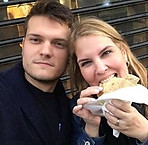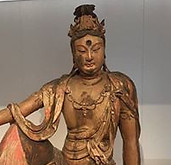Reflection



Born a first-generation only child to two Cuban parents and raised in Miami, Florida, which blurs the line between Latin and American societies, intercultural experience was not a benefit acquired in a study abroad trip or in the classroom of a college course, it was truly a lived reality for a Cuban-American like me. The nature of my “Cuban-American-ness” is reflected in my very name: my parents gave me the name John Michael in hopes that an English sounding name would garner me more success in the United States, but my last name, Balloveras, is unequivocally a marker of my cultural liminality. In this sense, by nature of my identity, I have always been an international scholar, always carefully measuring everything I encountered through two lenses: as an American, and as a Latino.
My experience in the International Scholars Program has only cemented and magnified my commitment to border-less exchange. It is true that I joined this program quite late, in my last semester at the University of Florida, in fact, but my passion for international relations, culture studies, and human development has luckily allowed me to integrate myself very quickly into the program. I hope I could use my experiences, highlighted in this ePortfolio, to prove my dedication to the international community.
Why did it take me so long to join the International Scholars Program? As most of my peers can verify, the path to becoming an international scholar is rarely clear. In Latin American homes, it is something of an assumed hope that a first-generation child will become either a doctor or a lawyer. I tried to satisfy my parents’ dream for me to become a doctor like grandfather before me. When I first enrolled in the University of Florida, I began as a biology student on a pre-med track. But I felt unfulfilled: yes, I could have handled the work load, but I would not truly enjoy it nor would it challenge me. I still wanted to work with people, not as a medical professional, but as a social one. Due to my background, I knew I wanted to act as a liaison between different peoples, so my decision to join the Political Science and International Studies departments became exceedingly clear.
I could have opted out of the International Studies major’s language requirement by testing out in Spanish. But my time in China, Thailand, and Taiwan impressed upon me a desire to break out of my status quo and to learn from what goes underrepresented. So I took up Mandarin Chinese as my language requirement and the Asia track as a concentration. In retrospect, it is one of the best decisions I have ever made in my academic career, as it is opened up for me a whole new realm of possibilities. I was no longer limited to the overly theoretical, empirical, and decontextualized study of international relations. I now had a balance to IR.
I had discovered some sort of modus operandi (balancing international relations and cultural contextualization), but I still had no idea how I would apply that in my life and in my career. But inspiration always comes from unexpected sources. To fulfill my International Studies category A requirements, my Chinese Studies minor requisites, and a personal curiosity that had manifested in me since my travels in Thailand, I took Introduction to Buddhism. I have drawn so much out of this course and subsequent experiences I have since taken. One of the most important lessons was on the Mahayana Dharma of karuna, compassion. The concept of not leaving one person behind, committing oneself to the fulfillment of all people (as part of the Bodhissatva path) absolutely resonated with me. This of course is not to say that I lacked compassion until that point: learning about karuna teaching simply gave a name to what I had always felt my role in the future should be, and naturally it is easier to implement an idea when it comes with a label.
My time spent in India gave me the opportunity to see karuna in action. I learned so much from the NGOs we visited and worked with. You can only learn so much in a classroom, and it was only by seeing people like Professor Kumanan of Sethu Bhaskaran schools and Ms. Archana Ramachandran of Teach For India actively seeking to make the lives of people around them better, in both small and massive ways, that I realized how I planned to make a difference in the world. My time India made me realize that one of the most serious issues in development is not a lack of policy and programs designed to aid people in need (though of course more of this policy would be highly beneficial), but that this aid rarely reaches the people it intended to help. I decided that I would apply my understanding of international affairs, politics, and cultural contextualization to the ends of bridging the gap between existent policy and unaccounted-for recipients.
After returning to the states, I’ve since set about trying to find which career would best serve my goal of capacity building and helping people access the rights and services they deserve and are warranted to have. I decided my firm understanding of international law would best serve these people. I guess my parents' wishes will come true after all!
In my last semester at the University of Florida, I more or less stumbled upon the International Scholars Program during a visit to the UFIC office. I realized that all this time, I had been completing the work of an international scholar, and never even knew there was a label to place on this work. I immediately joined, because I wanted a symbol of my dedication to acting as an intercultural, international liaison. The reflection above is a brief recounting of the processes that led me to this point. I stand now at a critical juncture between my time here in the International Scholars program, and a bright future in the service of others. I look forward to the next adventure.



